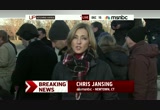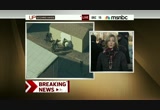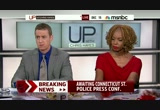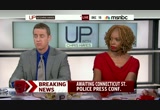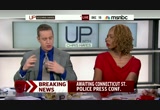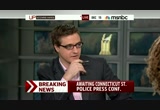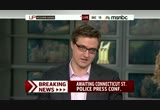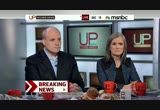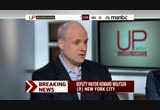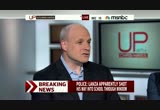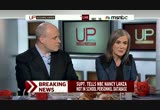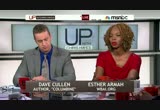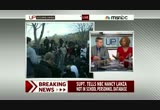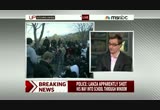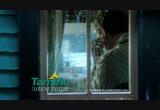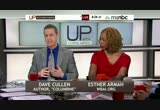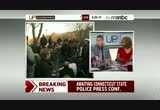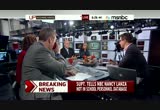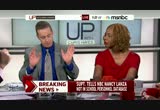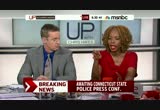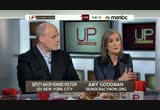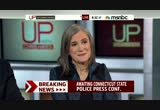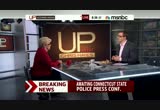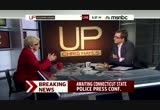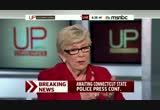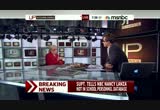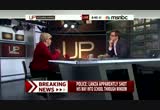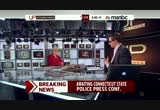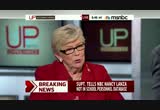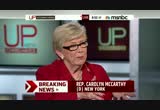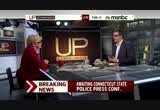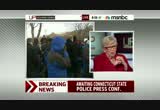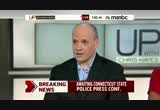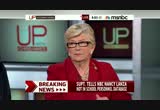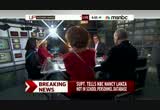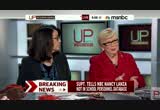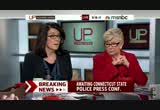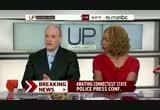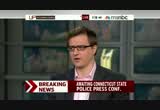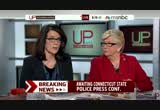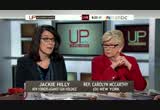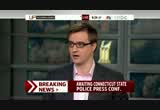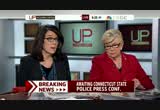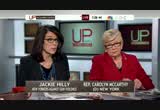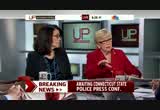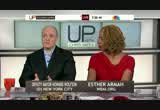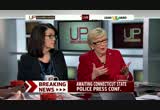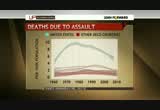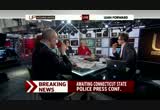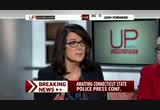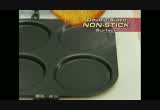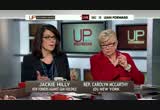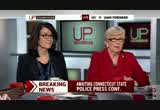tv Up W Chris Hayes MSNBC December 15, 2012 5:00am-7:00am PST
5:00 am
good morning from new york. i'm chris hayes. we are waiting to hear from lieutenant paul vance and lieutenant george are cinco of the newtown police department and the connecticut state police from what we know and don't know about yesterday's shooting at sandy hook elementary school. we know that the gunman has been didn't fied as 20-year-old adam lanza who first killed his mother and went to a kindergarten class in the school where he worked killing 27 people. 20 children, six adults and himself. two handguns were found at the school as well as a semiautomatic rifle. law enforcement told officials that the gun was licensed to the gunman's mother. president obama will address the media in his weekly address. we'll have that later. but some hope that he might make
5:01 am
an effort to tackle gun control for the first time. the shooting the deadliest in history as raised questions about the gun laws but also school security and preparation. we're going to msnbc's chris jansing who is outside of nowtown in connecticut this morning. chris, can you give us an idea of what we're learning, what new facts have we acquired? >> from the time, chris, went off the air last night, we saw a large exodus from the area around the school. we can stationed very nearby at the staging area which is in a local firehouse. and we began to see some of the coroner's vehicles leave. we saw four cars in a row with priests in them. we spoke with lieutenant vance who told me all of the identifies have been made. and all of the families have been officialed notified. the medical examiners' team did
5:02 am
work through the night and into the early morning hours. obviously, this is a situation where you want to make sure that you have everything absolutely right. and some of those identifications were difficult. they have described this shooter as chillingly accurate. of course, all the people who were shot, only one survived and was taken to danbury hospital. and there are also obviously a lot of questions we have. we are hoping to get those identifications this morning. i know that lieutenant vance has been working on them throughout the morning, again torsi make s everything that they do is absolutely correct. there are a lot of questions about the shooter. how he gained entry to the school. did he shoot his way in? was he let in? and of course, the very difficult question in all the situation, chris, is is why. we know from his brother, he told investigators who interviewed him yesterday after reaching him in his home in hoboken. he said his brother had some mental health issues. so a lot of questions to be
5:03 am
answered yet this morning. a huge gathering of international reporters. yesterday, i spoke with reporters from russia, from japan. a journalist from canada here as well. obviously, the fact that we have kindergartners, and elementary school students has touched a nerve in a way that i think some of these mass shootings have not before, chris. >> msnbc's chris jansing reporting from the screen in yesterday's shooting in newtown, connecticut, we'll be hearing more from you later. we're going to hold on. there's going to be a press conference in just a few moments. right now, my panel, dave colin, radio host of wbii-fm's wake-up call. howard wolfson from affairs at bloomberg. and amy. it's wonderful to have you here this morning on an awful and somber occasion. i want to start out by saying, dave, you know, i have this
5:04 am
horrifying realization yesterday that we have, you know, developmented a go-to roster of guests to deal with mass shootings which is sort of a chilling realization in a very basic human level. you get caught up in the news cycle. and one of the things i want to start out with, because right now there's a tremendous are demand for information. and an appetite for information, completely understandably. and everybody, my colleagues, are doing the best to feed that back and get people the information they need in a responsible fashion but inevitably, there's a lot of confusion in the wake of these. and one of the things that comes out very clearly in your book is just how much there was a mismatch between what we knew about columbine the first day, week and a half and what was actually the case. i want you to talk about a little bit so that everybody watching this can be cautioned that the narratives that we're forming, the judgments that we feel we have, the certainty we feel we have. yesterday, we thought we knew the name of the shooter that
5:05 am
turned out to be the actual shooter's brother. everyone is consuming that information with that grain of salt. >> right. i guess i'll say the same thing i said last week, i feel a little bad and it's worth repeating, unfortunately, you guys had me on last week which is sort of awful. but within two or three days after columbine, we had it completely figured out. everybody understood what happened there. two angry loner goths from the trench coat mafia who were pissed off at jocks went back and slaughtered some jocks and took other people down in the process. that's what everybody understood. to this day, most people think, and not one single bit of that is true. they weren't goths, they weren't part of the mafia, nothing that
5:06 am
they were bullied. they weren't loners or outcasts. none of that. but we took this information and drew this picture. one thing that we heard that is useful, the brother of the shooter said that he had mental health issues. that's a really useful piece of information. >> right. >> we should take that in in gathering information but also with this huge caveat, that can mean all sorts of things. >> yes. >> and, and, the brother may -- one moment in times, perhaps thinking off the top of his head who may have just been thinking, that may not even be reliable information, even though i thought he meant it authentically at the time. a lot of "buts. ." >> can you talk about the collective trauma that a community goes through. i think we all have a hard time doing anything but despairing. >> yes. >> it's very despairing-inducing set of facts. i wonder how the community
5:07 am
reacted in columbine. >> well, a whole lot of things. in fact, i mean, one thing that i can tell the moms which may or may not be relevant and they might not want to hear. i was thinking as i was lying in bed this morning, not able to sleep. i'm feeling a little guilty struggling with that and realizing, remember, 13 years ago, nobody had slept. i talked to the kid. i was back that plymouth park 12 hours later and none of the kids slept. all of them said these were high school kids. they said their moms were hugging them like crazy yesterday, the day of the event. that was so important that now they needed them to stop. especially all that week, the kids were telling me more and more, almost all of them, that their parents, particularly their moms were too overprotective and were pushing them away. and they were literally leaving their houses and escaping and owe.
5:08 am
>> i'm very sympathetic. >> i know, it may be different with kids this age. but that's just one caution to check in. that kids are in different places than their parents said it was really, really hard for them. the kids had each other. and there's this amazing sense of -- almost like a war thing of having gone through it together. >> yeah. >> they really only wanted -- well, they wanted to talk to people who had been through it it with them. they also wanted to talk to other outside adults. i felt also guilty at the time really spilling everything to reporters. i think partly, we were adults who weren't overprotective parents. they wanted talk to somebody who could help them figure it out. >> you know, when one of these happens, it seems there's ruts that are developed. not only ruts developed in our editorial process, but there are ruts developed in the national debate and it starts to play out on twitter in basically the same way. almost like a computer program has programmed national popular reaction. obviously, when guns are
5:09 am
involved. people say guns. another part of people say, it's crazy, don't politicize this. i want to talk about guns at length today. you can't separate. but i want to actually put that to the side to begin the conversation. because one of the things -- the first thing i want to discuss. i want to play this bit of tape that was on fox yesterday that made me really think hard about how i react to these kind of tragedies in a policy context. and i think i want to talk about the ways in which we respond to horrific events, from a policy perspective. and a political perspective. because i think if you look at the history of a lot of policy, right? there's a connection between tragedy and action. the triangle shirt factory and workers laws. obviously what happened in 9/11 and the entire regime that's been put into place.
5:10 am
i thought about this when i saw this clip, one of our producers found from robert strange who runs a security firm talking to fox, take a look. >> you know, i have two kids now i suddenly want to see an armed police officer in the school. i never thought of that prior to now. what would that take to have an armed police officer in every school? >> unfortunately, i think we just saw it. i think we just saw it. i think it's going to change the way we look the athings. i think this is going to be for schools what 9/11 is for airports. >> this will be for schools what 9/11 is to airports. i want to get your thoughts on that, how we think about security, particularly in the wake of this after this break. at first, jake's family thought they saved ziggy, but his connection with jake has been a lifesaver. for a love this strong, his family only feeds him iams. compared to other leading brands,
5:11 am
it has 50% more animal protein... ...to help keep ziggy's body as strong as a love that reaches further than anyone's words. iams. keep love strong. for thos...this...ions of doing than this...s words. ...and this, dancing in their heads... ...we have these. home depot gift cards. give the gift of doing, in-store or online. c'mon, michael! get in the game! [ male announcer ] don't have the hops for hoops with your buddies? lost your appetite for romance? and your mood is on its way down. you might not just be getting older. you might have a treatable condition called low testosterone or low t. millions of men, forty-five or older, may have low t. so talk to your doctor about low t. hey, michael! [ male announcer ] and step out of the shadows. hi! how are you? [ male announcer ] learn more at isitlowt.com. [ laughs ] hey!
5:12 am
gives you 1% cash back on all purchases, plus a 50% annual bonus. and everyone...but her likes 50% more cash. but i'm upping my game. do you want a candy cane? yes! do you want the puppy? yes! do you want a tricycle? yes! do you want 50 percent more cash? no! ♪ festive. [ male announcer ] the capital one cash rewards card gives you 1% cash back on every purchase plus a 50% annual bonus on the cash you earn. it's the card for people who like more cash. what's in your wallet?
5:14 am
mayor bloomberg, obviously, any may mayor, particularly in new york city, are thinking about a city lock. we talked about this being a 9/11 situation. it's a chilling phrase, the way we responded to 9/11 having been long-term productive in terms of our resources and in terms of security. my question is to you, how do you you think about making policy in the aftermath of this, that doesn't fall prey, to making those kinds of mistakes? >> well, there be obviously, instances in which governments overreact, or react incorrectly in the wake, in the immediate wake of a national tragedy. and i think it is incumbent upon chief executives, members of the ll legislature to think thoughtfully, to take a deep breath, and gather the facts before rushing forward with a solution or another. i will say, though, with regard
5:15 am
to these kinds of shootings and gun violence. i don't think that's our problem. >> right. i think in some respects, we have the opposite problem, when these incidents occur, you hear these voices, as you said, now's not the time to talk about what we do about this. or we don't went to politicize the tragedy by talking about legislative solutions. and i think those voices really have been the loudest ones over the last decade or so after these kinds of incidents. and they've kind of drowned out voices like mayor bloomberg's or others who think, you know, what we do need to act. i think, perhaps in the wake of yesterday, that's shifting a little bit. i think the voices and the preponderance of the american public may now think, yes, we don't want to act perform, precipitously. but we do want to act. and there are things that we need to do to adjust our laws to
5:16 am
take into account these kinds of activities. >> okay. >> i mean, i think there's no question right now, in the wake of this horrific event, there is month more important time to talk about it right now. if people were driving through an intersection there was no traffic light. and every day, they were crashing into each other and people were dying. we wouldn't say it's a political solution to say why don't we put up a traffic light. >> right. >> right now, this is the moment, not only for president obama, it would be a real test of his leadership, most people in this country are for regulating guns. how is it that there are 9,000 gun deaths in the united states in the year, 150 or 70 in germany. sigh was talking to michael moore last night. australia, a country of hunters, after a terrible mass killing in 1986, in a moment, they turn around, gun rocontrol, it goes
5:17 am
zero. there are two issues here, one is gun controls and the cuts taking place around mental illness. we don't know particularly in this case, what adam lanza's condition was, but we know if we look at the string of killings takes place from aurora, on back, not to mention what happened this week. this is a very serious issue, that the issue of mental illness, its stigma, and the lack of support and our problems with health care in this country, you put these two together, and it is a perfect storm. gun control and helping to support people who are mentally ill in this country. >> what i find so disturb sergeant reaction is a always around the additional criminalizing, of those, least involved in the attack and the deaths. so we talk specifically about the importance of having more security in schools. so now 5-year-olds -- an armed
5:18 am
policeman is what 5-year-olds need. yet, to exclude gun control is not viable. so i think we have the power on the congress and senate. you have the power of the nra but on the ground so many millions of people are advocating for gun control. so i think at this point, you need to -- when you think about the strategic coalitions that make people power recognize that the nra's not omnipotent, it may behave like god, but actually, it's not. also what we need in schools, more detectives in schools in new york, in urban areas, that's exactly what you have. and what you have is criminalization of young people. particularly people of color. when you think of a piece like mother jones that takes you over 60 years, most of the guns are
5:19 am
illegal. >> that's clearly what we have in this case. >> that's what we have, the guns were legal. so what we never want to do is go to where the power and profit sits. so what we do, we talk about we need this for children. and we need to deal -- we need to criminalize the mental health which is what we will do, but what we don't do is treat the issue. >> also, we have a security mind-set, understandably, right? exactly. the impulse of apocalypse for security is primal and some ways the way all other politics should be dealt. you know, if you don't have security, then a lot of the things that about the way we self-govern become very difficult to pull off. yet at the same time, i don't think we necessarily think in say rigorous fashion about security. a lot of security poses, this is eric madfast who assistant professor in tacoma.
5:20 am
he has studied mass shootings, particularly school shootings. he said one of the key findings to emerge from my research is that he's incidents were not prevented through enhanced security measures. but instead by alert students and faculty members coming forward with knowledge about a violent plot being planned. and a vast majority, prepare trart perpetrators inform multiple people about their plans in advance. dave, i guess my question is, is there some set of policy framework you can imagine that? metal detectors that isn't armed police officers in every kindergarten in this country is which is distilted vision. some policies that would interrupt before it happens. initiated.
5:21 am
neural speeds increasing to 4g lte. brain upgrading to a quad-core processor. predictive intelligence with google now complete. introducing droid dna by htc. it's not an upgrade to your phone. it's an upgrade to yourself. tdd#: 1-800-345-2550 at schwab, we're committed to offering you tdd#: 1-800-345-2550 low-cost investment options-- tdd#: 1-800-345-2550 like our exchange traded funds, or etfs tdd#: 1-800-345-2550 which now have the lowest tdd#: 1-800-345-2550 operating expenses tdd#: 1-800-345-2550 in their respective tdd#: 1-800-345-2550 lipper categories. tdd#: 1-800-345-2550 lower than spdr tdd#: 1-800-345-2550 tdd#: 1-800-345-2550 and even lower than vanguard. tdd#: 1-800-345-2550 tdd#: 1-800-345-2550 that means with schwab, tdd#: 1-800-345-2550 your portfolio has tdd#: 1-800-345-2550 a better chance to grow. tdd#: 1-800-345-2550 and you can trade all our etfs online, tdd#: 1-800-345-2550 commission-free, from your schwab account. tdd#: 1-800-345-2550 tdd#: 1-800-345-2550 so let's talk about saving money,
5:22 am
tdd#: 1-800-345-2550 with schwab etfs. tdd#: 1-800-345-2550 schwab etfs now have the lowest operating expenses tdd#: 1-800-345-2550 in their respective lipper categories. tdd#: 1-800-345-2550 call 1-800-4schwab tdd#: 1-800-345-2550 or visit schwab.com tdd#: 1-800-345-2550 to open an account today. tdd#: 1-800-345-2550 funding is easy tdd#: 1-800-345-2550 with schwab mobile deposit. tdd#: 1-800-345-2550 investors should consider tdd#: 1-800-345-2550 carefully information tdd#: 1-800-345-2550 contained in the prospectus, tdd#: 1-800-345-2550 including investment objectives, tdd#: 1-800-345-2550 risks, charges, and expenses. you can obtain tdd#: 1-800-345-2550 a prospectus by visiting tdd#: 1-800-345-2550 www.schwab.com/schwabetfs. tdd#: 1-800-345-2550 please read the prospectus tdd#: 1-800-345-2550 carefully before investing. tdd#: 1-800-345-2550 is bigger than we think ... sometimelike the flu.fer from with aches, fever and chills- the flu's a really big deal. so why treat it like it's a little cold? there's something that works differently than over-the-counter remedies. prescription tamiflu attacks the flu virus at its source. so don't wait. call your doctor right away. tamiflu is prescription medicine for treating the flu in adults and children one year and older whose flu symptoms started within the last two days. before taking tamiflu tell your doctor if you're pregnant,
5:23 am
nursing. have serious health conditions, or take other medicines. if you develop an allergic reaction, a severe rash, or signs of unusual behavior, stop taking tamiflu and call your doctor immediately. children and adolescents in particular may be at an increased risk of seizures, confusion or abnormal behavior. the most common side effects are mild to moderate nausea and vomiting. the flu comes on fast, so ask your doctor about tamiflu. prescription for flu. darrell hasn't been able to visit his mom back east in a long time. [ mom ] things are sometimes a little tight. i wasn't able to go to the wedding. [ emily jo ] since darrell couldn't get home, we decided to bring home to him and then just gave him a little bit of help finding his way. ♪ [ laughs ] [ applause ] i love you. i love you. [ male announcer ] get together at the rekindle share event. buy one holiday drink, get one free this thursday through sunday.
5:24 am
dave cullen, i asked you before you went to break, if you can imagine a set of policies being implemented that aren't medal detector it's and aren't armed preliminary in kindergarten classes that could have a plausible -- that would increase our chances of stopping people before they do something horrific like this? >> yes, there definitely are. most of are not what people think. first of all, let me tell you what we have done and what the person in the quote alluded to which is fantastic. it's that most of these plots are foiled now, it's by kids telling adults because the fbi calls it leakage. shooters leak theiren floridas. so awareness, this kind of things. that's helpful. but the other thing that we can do, believe it or not, is treating depression. there's three different types of kills who most of these. we can talk about it if you want. but the biggest group are the
5:25 am
angry depressives. we're not just talking depressives like sad. a deep suicidal angle that goes on for years. they get to a state of helplessness and hopelessness where they're distraught and they feel like they're going to lash out in some, quote, crazy way, an that's how we get to that place. >> you know -- >> let me just -- it's hard to identify. there's millions of kids who are depressed right now. we don't want to target all of them. >> we don't want to criminalize. >> exactly. exactly. what we want to do is help those kids most of whom are going to have problems like dropping out of high school, drug and alcohol addiction. teenage early pregnancy, and just messing up their lives. so if we would address this huge problem of adolescent depression which is usually when it first manifests, in the process, we'll help all these kids that
5:26 am
somewhere mixed in there will be all these future school shooters who we don't know about that we'll help and neutralize without knowing we did that. but the net effect -- >> that's right. it's good policy -- >> i was going to say after the arizona shooting with gerald lockner, just to make this point, 12 hours before this killing, this massacre took place was a man in china who went into an elementary school. maybe people saw it fleetingly on television. and he had a knife. he didn't have a gun. and he knifed 23 people. 22 of them children, at least at this point, at the time of broadcast, all survived. it was a knife. it wasn't a gun. >> right, right. >> gun control is the answer right now. >> right. >> you know, in the wake of columbine, schools did kind of take a look at what happened and
5:27 am
made a series of recommendations that now are in place in most part of the country, that when a teacher learns of a plot, they immediately have to report it to somebody. they encourage children to do that. so there are a set of policies in place that perhaps have prevented these kinds of f factions from taking place. the problem you have among others, this is not a high school student. gerald lockner, not a high school student, once somebody leaves high school and goes to college or goes on with their life or they're depressed and potentially suicidal, there's less of a community around them to help them and identify that. >> at virginia tech, a great example of that. in the very much larger college community he was much more lost in the system. people were trying to get him help.
5:28 am
he actually checked himself in at one point. yeah, in that morass, it's that much harder. >> the gunman adam lanza has been identified and he took his own life. so we know there was suicide. he wasn't shot by police officers on the scene. it was suicide. we have confirmed report from chris jansing reporting on air, that in being asked questions by police, his brother, who was initially wrongly fingered as the shooter, mentioned his brother had mental health issues. but we don't know anything about his mental health history. what kind of diagnosis he had. i just want to be clear, we do not know what that profile looks like. that said, i will note just in my own life, i've had, you know, a tremendous -- a lot of people very close to me who have wrestled with mental illness. really severe in some cases, and it's incredibly difficult to watch someone that you love go through struggling with mental
5:29 am
illness. part of what i think makes it hard is that it does feel -- one of the things i've noted it does feel outside the social contract in some ways. it's not a topic of policy we have. there's a tremendous amount of stigma around it. even to the point when we saw this whole jesse jackson jr. play out about what is he up to, is it drug addiction, all this moral judgment attached to whether it's drug addiction or something else. and the third thing, the amount of resources and the people i know in my life who have successfully managed to seek treatment and be treated in a way that's allowed them to flourish as human beings. it has been an unbelievably expensive undertaking. and they have been people with a lot of resources. luckily, you know, family members and other people who can find those resources for them. and i think all the time about what that same life trajectory
5:30 am
would look like if not in close proximity, that sort of thing. >> yeah, or if he was young and black living in new york. or living in the south side of chicago or d.c. i think we're talking about cultures. so you made the point that, you know, we are a nation that is about security. but we are not about security for all americans. and that is profoundly clear by the way in which we criminalize the mentally ill. so we don't know the details of who mr. lanza was. but we know in this country, you look at the statistics of those incarcerated so many of them are actually mentally ill. that is not about security. that is about the profit from incarceration. so the idea of security that is tagged to dollars, and then so profoundly politicized to the point of paralysis, to the point of cowardice from our so-called leaders. it makes me crazy, because what we never do is deal with the
5:31 am
actual source of the power and the organizations who use a mixture of fear and threat and lies and statistics to maintain a position that means that we keep having conversations around -- >> and there's also -- >> there's also these places of policy where we can have this sort of marginal discussions. if we found that the shooter's name was abdullah mutallab, and attending a mass, everything would be different. the way it would rise, the policy conclusions that people come to, washington would now be on fire with policy discussions. with official policy discussions about -- and no one would say don't politicize the tragedy of someone named abdullah mutallab walking into a school. >> that's what honors the children and the mother of adam lanza who was killed. right before the first presidential debate, i went to
5:32 am
virginia tech. colin goddard, one of the victims, one of the 33 who didn't die but has three bullets in him you today. took me through the place where he was shot up and where his teachers were killed at virginia tech. i was with him because the next day, president obama and mitt romney would be holding their first debate at the university of denver, and he was leading the campaign, to get the moderator, jim lehrer, the pbs host, to ask the question about gun violence. after all, the debate was taking place in colorado. you had oaurora about that. tens of thousands of signatures, was a question asked? no. >> and basically both candidates did everything they could to not address guns. it was like the answers that that precipitated were really remarkable. dave cullen. amy goodman of democracy now.
5:33 am
we're going to talk with congresswoman carolyn mccarthy whose husband was killed by the long island gunman right after this. .. [ shirt ] merry christmas, everybody! not so much. ho ho ho! this isn't that kind of deal. [ male announcer ] break from the holiday stress. save on ground shipping at fedex office. [ male announcer ] by earning a degree from capella more iuniversity, you'll have the knowledge to make an impact in your company and take your career to an even greater place.
5:35 am
i have obligations. cute tobligations, but obligations.g. i need to rethink the core of my portfolio. what i really need is sleep. introducing the ishares core, building blocks for the heart of your portfolio. find out why 9 out of 10 large professional investors choose ishares for their etfs. ishares by blackrock. call 1-800-ishares for a prospectus which includes investment objectives, risks, charges and expenses.
5:36 am
read and consider it carefully before investing. risk includes possible loss of principal. joining me now is congresswoman carolyn mccarthy whose husband was killed in the long island massacre. and who has made gun control a policy for a political career. i appreciate you coming in now. >> thank you, chris. the pleasure is all mine. >> i guess, i know this is probably difficult emotionally for you right now, given what you lived through. but i did want to ask you, if you wouldn't mind, taking me through how you came to work through the grief that you had as a personal tragedy. and then come to believe that there was a political and policy factor in what had happened? that there was a matter of public import, political import, that really did kind of change
5:37 am
the trajectory of your life in terms of what you did and what party i think you're registered with. >> right. >> and led you to ultimately run successfully for congress. how did that journey happen in terms of going from just the overwhelming emotion of what had happened to seeing it in these political terms? >> well, to be very honest with you, if you look at my situation, on what happened on long island railroad back in 1993, my husband died. my son was fighting for his life. and my training as a nurse kind of -- i can't do anything about my husband. he's dead. but i had my son to concentrate to. and i think that's what gave me the strength to get through everything that we were facing for the years to come. i worked in icu for the majority of my life. even as a nurse, seeing my son being rolled in from recovery, i didn't recognize him. and even though i'd been trained
5:38 am
for this, i was not prepared for what i saw, especially when you love someone. and with that being said, all my energies went into taking care of my son, to make sure that, number one, he survived. number two, his goal was to walk again. that was my goal. and i told him very early on, i'm not going to be your mother. i am your nurse. and you're not going to like me at the end of it. and at the end of it, when he was being released from rehab, he said, mom, you told me something a long time ago. i did not like you. but to be very honest with you, when kevin was learning how to -- and i'm making this very, very simple. when kevin was learning how to speak again, he did ask me, how could this happen? i didn't have the answer. and that's when i became a little bit more involved, trying to find out, why was this kind of gun violence? why was he able to get a gun? why did he have so many bullets.
5:39 am
and to be very honest with you, i got involved with neighbors against gun violence at that time. went up to albany, and i met so many victims. and i was the star. and i said to myself, am i the newest star because i'm the newest victim? in the meeting with the politicians. and they basically ignored us. we were there. we were talking to them, and they weren't paying attention. and i was furious when i left. absolutely furious. then i got involved with president clinton, trying to get the assault weapons bill passed because we had put language in there for large magazine clips. >> which were used in long island? >> they were used on the long island railroad shooting. and meeting with my congress people and other congress people from long island, and their attitude and how they were going to vote and how they said, yes, they were going to support the president. and then turned around and voted the other way. happened to be just walking down
5:40 am
the steps of the capitol. a reporter came up to me after the vote, that my congressman voted to repeal the assault weapons ban, how mad are you? i'd be honest with you, i was furious. they said, would you run for congress? and i said yes. i didn't think anybody would pay attention to what i said. by the time i got home, people were ringing my door bell, coming at my house. somebody named dick gephardt called, do you want to run? i didn't know who he was, i didn't know who they were. it just started that way. it just started that way. so when you say how i handled my grief, you can't compare it to what -- well, other people. each person handles their grief are totally different. some handle it well, some don't. some become activists. not just on gun violence. you know, i've had the pleasure of meeting children that have taken care of their parents with
5:41 am
alzheimer's disease. parents that have taken care of their children with autism. and they have become activists. so each thing throws us into maybe a path that we certainly didn't want to take. but decided that we must. >> i want to talk to you about -- it sounds like you had a radicalizing experience coming up against the way in which gun policy is made. in politics. and i want to talk a little bit to you about that, about where where we were before, where we are now, where we're headed, right after we take this break. ...and this, dancing in their heads... ...we have these. home depot gift cards. give the gift of doing, in-store or online.
5:42 am
that was me... the day i learned i had to start insulin for my type 2 diabetes. me... thinking my only option was the vial and syringe dad used. and me... discovering once-daily levemir® flexpen. flexpen® is prefilled. doesn't need refrigeration for up to 42 days. no drawing from a vial. dial the exact dose. inject by pushing a button. flexpen® is insulin delivery... my way. levemir® (insulin detemir [rdna origin] injection) is a long-acting insulin used to control high blood sugar in adults and children with diabetes and is not recommended to treat diabetic ketoacidosis. do not use levemir® if you are allergic to any of its ingredients. the most common side effect is low blood sugar,
5:43 am
which may cause symptoms such as sweating, shakiness, confusion, and headache. severe low blood sugar can be serious and life threatening. ask your healthcare provider about alcohol use, operating machinery, or driving. other possible side effects include injection site reactions. tell your healthcare provider about all medicines you take and all of your medical conditions. get medical help right away if you experience serious allergic reactions, such as body rash, trouble with breathing, fast heartbeat, or sweating. with flexpen®... say good night to vial and syringe. ask your doctor about levemir® flexpen. covered by 90% of insurance plans, including medicare. find your co-pay at myflexpen.com. she also likes to ride her bike. she knows the potential for making or losing money can pop up anytime. that's why she trades with the leader in mobile trading.
5:44 am
so she's always ready to take action, no matter how wily... or weird... or wonderfully the market's behaving... which isn't rocket science. it's just common sense. from td ameritrade. hi, i'm ensure clear... clear, huh? i'm not juice or fancy water. i've got nine grams of protein. that's three times more than me! [ female announcer ] ensure clear. nine grams protein. zero fat. in blueberry/pomegranate and peach. congresswoman, i want to play a bit of sound from president bill clinton on gun control in 1993 because i think it's important for us to sort of understand the context of this policy issue which is the politics of it have fluctuated so wildly in so many ways. one of the real changes in my
5:45 am
relatively brief career covering politics. this is president bill clinton on gun control after the 1993 long island railroad shooting that killed six, among them your husband. take a look. >> the gun that was used contained apparently a two 15-round clips that were expended while this man in a manic state was walking down the subway. and one of the reasons we ought to pass the crime bill is senator feinstein's amendment to limit assault weapons to limit those 15-round clips illegal. they're not necessary for hunting or sports purposes. and simply allows you to shoot more and more people more quickly. so i hope this will give some more impetus for the need to act more urgently.
5:46 am
>> it was a gun control, it was companioned by democrats. it was something that people came to washington, d.c. to march about. there was a lot of discussion about it, as you go back and watch old issues of "the west wing," it's like every episode is about gun control. >> absolutely. and then it kind of fell off the map of politics. and i wonder what your understanding why that happened is. >> well, there's actually a couple myths throughout if you know what happened back then if you remember after the bill was pass, the democrats lost the election. what everybody kind of forgets is, also during that term, taxes were raised to get us into the economy. >> sure. right. >> to do what was right for the country. >> right. >> so it was very easy for
5:47 am
certain groups to turn that debate around to be a myth. and that myth only grew. that's when you saw a lot members of congress saying i'm not touching this issue again. even the democratic party. started to believe this myth. and even our leadership, on the democratic side, walked away from the issue. >> and in 2000, obviously, al gore lost. and there were lots of people that, again, i think the nra and gun advocates were able to tell a story about gore's loss being attributable to the fact that he was, you know, for regulation, for control, for the assault weapons ban. and that hurt him in the national campaign. >> well, again, i disagree with that. and not because of the issue. but if you really look at the politics of what was going on during that particular election, and, you know, certainly, vice president gore, i thought he was a great person. i loved the issues that -- but he tried to be something that he
5:48 am
wasn't. you know, going way back, i said to him, i said, don't let them try to turn you. just be yourself. and i remember he was giving a speech to the irish-americans, and he comes out with all these papers to read his speech. and i looked at him, i'm going, because we were working on the good friday agreement at the time. i said, what are you doing? if you go out there and try to read a speech to these people, you're not going to get their vote. to his credit, he went out there and gave an absolutely wonderful speech. i think people forget when they go into politics, be who you are. i will say that to an awful lot of members that lost this last election. they went to the far right. i'm talking about my republican colleagues. they went to the far right and that's not who they were. and they lost. >> but the near total retreat of the democratic party on this issue, it's hard for me to come up with another analog, or historical example. and i just -- i want to get a sense from you of why that is
5:49 am
5:50 am
5:52 am
we're still waiting on a press conference from police officials in newtown, connecticut, this morning. with more information about the latest about the mass shooting there. i have with me congresswoman carolyn mccarthy from long island, whose husband was killed in the long island railroad shooting in the 1990s. the retreat on democrats on this issue has been almost complete, i mean, at the national level. not necessarily at the local level, i was a reporter in illinois where there's still pretty strong political contingency for gun control and legislature who fight for it. but the national level, what explains that in your mind, and how do you reverse it? >> well, to be very honest with you, i have great hope for the near future that we can reverse that. when you look at the nra and
5:53 am
their fund-raising skills, being supplied by money, large amounts of money, going from the gun manufacturers, and if you look at who they actually support, they'll throw a token democrat in here and there. but with that being said, the power that they have over state legislat legislators, certainly members of congress, certainly members of the senate. so this myth that's out there, basically, you're saying you either vote for us, or we come against you and you lose. which if you saw in the last election, i know that mayor bloomberg, you know, he decided he was going to go one more step on trying to reduce gun violence. and he went after a republican or a democrat, and took the other challenger and gave them money. i personally believe mayer bloomberg is going to be a force in the future. >> we had howard wolfson here one of the strategists who is going to join us in a second.
5:54 am
here's a question about the nra. the nra becomes this behemoth in individuals. i wonder how much that helps the nra themselves. if almost everybody is complicit in saying the nra wants you no know they're powerful. is there a self-fulfilling prophesy about the power of the nra? >> well, in my opinion, there is. if you actually look at the courts across this country where you have a number of lawyers that take pro bono, going into court, fighting things that are nra, going in on local issues, we're winning on that side. that never gets sent to the paper. >> right. >> so, again, you know, it's this myth out there. when the supreme court came out and said a person had a right to own a gun, i'm saying to myself, okay, that issue is off the table now. you have a right to own a gun. if you look at any literature that the nra puts out or any
5:55 am
e-mails that they put out. what does it say? they're coming to take your guns away. so you have people that don't follow a subject as closely as we do. everybody out there, hunters, especially, even the police officers who think they're going to take their guns away. >> you know, america has a gun issue rate that almost twice the next highest country, number two is yemen. number three is switzerland. switzerland is declining. switzerland mandates that male citizens have that, from well-regulated militia days. yemen is not a place that american policymakers look to emulate in other contexts. i think there are people who say, no, it's not the nra, it's that americans like guns. it's a deep part of our culture. and you people who want to regulate guns, your problem isn't with this industry. your problem is with the american people. your problem is with democracy. your problem is with a population that from the very
5:56 am
beginning has had this deep affection, strong connection, culturally to the guns. >> i think if you actually are able to explain to the american people, what am i asking for? anybody that buys a gun, you have to go through a background check. the majority of nra members actually believe that because they know there are honest citizens, most of them are hunters and sportsmen. >> right. right now, we should say that the gun show loophole called means that i think 40%, if i'm not mistaken, 40% of guns are purchased without a background check. >> absolutely. and not even counting what the store purchases might be which happened unfortunately with columbine. so there's precedence here on what we need to do. you know, terrorists can go on to a plane. but banned from getting on a plane, rather, but they can buy a gun. >> right. >> where do you see the balance of that? so when you think about what the nra has been pushing the legislators to do.
5:57 am
west, two weeks ago, senator coburn went on the house floor saying it was a disgrace stopping veterans to get their guns. what he doesn't explain is these are veterans that have been adjudicated through the veterans administration to be incompetent. but he wanted them to be able to have their guns. >> i want to talk about the politics of this which are tricky and talk about how we might see a change. we're also awaiting a press conference from newtown, connecticut. the president called to stop tragedies like this. what that should look like, next. i need to rethink the core of my portfolio. what i really need is sleep. introducing the ishares core, building blocks for the heart of your portfolio. find out why 9 out of 10 large professional investors choose ishares for their etfs. ishares by blackrock. call 1-800-ishares for a prospectus which includes
5:58 am
investment objectives, risks, charges and expenses. read and consider it carefully before investing. risk includes possible loss of principal. ♪ now, that's cardworthy. [ man ] all right. here we go. ♪ cardworthy. [ camera shutter clicks ] cardworthy. ♪ so not cardworthy. ♪ [ female announcer ] there's still time for your perfect holiday card this season. at shutterfly.com. a regular guy with an irregular heartbeat. the usual, bob? not today. [ male announcer ] bob has afib: atrial fibrillation not caused by a heart valve problem, a condition that puts him at greater risk for a stroke. [ gps ] turn left. i don't think so. [ male announcer ] for years, bob took warfarin, and made a monthly trip to the clinic to get his blood tested.
5:59 am
but not anymore. bob's doctor recommended a different option: once-a-day xarelto®. xarelto® is the first and only once-a-day prescription blood thinner for patients with afib not caused by a heart valve problem, that doesn't require routine blood monitoring. like warfarin, xarelto® is proven effective to reduce the risk of an afib-related stroke. there is limited data on how these drugs compare when warfarin is well managed. no routine blood monitoring means bob can spend his extra time however he likes. new zealand! xarelto® is just one pill a day, taken with the evening meal. and with no dietary restrictions, bob can eat the healthy foods he likes. do not stop taking xarelto® rivaroxaban without talking to the doctor who prescribes it for you. stopping may increase your risk of having a stroke. get medical help right away if you develop any signs or symptoms of bleeding, like unusual bruising or tingling. you may have a higher risk of bleeding if you take xarelto® with aspirin products, nsaids or blood thinners.
6:00 am
talk to your doctor before taking xarelto® if you currently have abnormal bleeding. xarelto® can cause bleeding, which can be serious, and rarely may lead to death. you are likely to bruise more easily on xarelto®, and it may take longer for bleeding to stop. tell your doctors you are taking xarelto® before any planned medical or dental procedures. before starting xarelto®, tell your doctor about any conditions, such as kidney, liver or bleeding problems. ready to change your routine? ask your doctor about once-a-day xarelto®. for more information including cost support options, call 1-888-xarelto or visit goxarelto.com. i'm chris hayes. here with new york city deputy mayor howard wolfson, esther
6:01 am
armar, jackie and carolyn mccarthy, congresswoman. we're awaiting the press conference from newtown, connecticut. we, of course, will bring that to you live. mayor bloomberg made quite a bit of news on the last election cycle, in which he used some of his personal money to start a super pac, and spend money on candidates specifically on the gun issue. and made the inner vention in the mayor race. tells us what went on there. >> he started an organization called mayors against illegal guns that now has over 500 mayors around the country, and so this is an issue that he's very passionate about. he became very frustrated and angry during the presidential campaign that this was not an issue that either of the candidates was addressing.
6:02 am
we talked about that in one of the early segments. and after the debates in which the answers were so lackluster, he decided that he was going to take action on his own and start a super pac, and spend money to influence policy around this issue. so, he -- we, identified candidates who had been a-rated by the nra. who we saw as potentially vulnerable running against people who would do a better job if they were elected. and we spent over $10 million to influence those elections. the particular race you ask about, long time incumbent congressman joe baca from california. >> who set next to you, congresswoman? >> for years. >> a democrat, running against a california legislator, in a
6:03 am
somewhat redrawn district. it was not on anybody's radar screen. when we went in and polled, both candidates were 30%. >> this is a primary challenge? >> no, in california they have nonpartisan elections so two democrats can be in the race against each other. >> i geright. >> polled the race, neither one has the money to go on television in the los angeles media market. and we said this is a perfect opportunity to go in and make a strong statement about what could happen if you vote with the nra. we spent over $2 million on that race. and joe baco was defeated. and you talked earlier about the narrative in congress. the perception in congress after 1994, that if you voted against the nra, you'd lose your seat. and i think that the congresswoman is exactly right. that myth has taken hold. and it's one of the ways that the nra has kind of had a
6:04 am
stranglehold on congress, on this policy, this issue. we wanted to change that story. we wanted to make it clear to members of congress that there could be a price to pay if you voted with the nra. >> right. >> and you know, i know that joe baca has gone back and talked to all his colleagues about why he lost. and i hope he tells everybody in america why he lost. he lost because he voted consistently with the nra. he lost because he was out of step with that issue, and he lost because people finally learned about the bad votes he had taken. not just on that issue, but other issues as well. you know, the mayor said this is a model for how he wants to approach this issue going forward. >> by the way, he's absolutely right. because the first day that we came back after the election, he came up to me, and he said, i lost my election because of mayor bloomberg. and i said, it's not like i hadn't warned you. i said to you for years, we sat next to each other. background checks, why can't you
6:05 am
sign on to this simple piece of legislation? everybody should be able to go through a background check. so i hope, certainly, i support the mayor in going after the republicans and democrats in trying to make a difference. >> i was just going to say, i think one of the interesting things that happened in that race and other races, the mayor has been an independent voice, backed up by others similarly situated in issues. i think he's bringing ahead a coalition of people that deal with gun violence every day, law enforcement, domestic violence community. it's what we were talking about before in the green are room, the people of the country are starting to realize. but the mayor has done a great job of putting a national voice on that. >> my father is on the board of your organization, i've given you guys money. that's on the money. obviously, i support what you do. one thing that i thought was interesting about the baca race,
6:06 am
i thought this was an interesting -- this is an interesting fact about where the nra is headed and how it might be opening itself up to vulnerability. and the nra is not making anyone available to the press. it's not like we're talking about them and they're not in the room. they're not doing press right now. baca did not get an a report. he refused to sign on to some letter about the fast and furious pseudo scandal. what's interesting about that, if their litmus test is do you sign on, basically, they're saying republicans only. that was as partisan as it got. the nra's strength has genuinely be bipartisan. it's had democratic support. it's been able to processably support the democrats in races. it seems to me, jackie, this is something that you work on, that they're moving in a more partisan direction. you have the republican party
6:07 am
and nra stacked up and more tightly fitting with each other and less genuinely sort of a bipartisan operation. >> i think at this operation, the state level and national level, most of the people have been supported by the nra are republicans and the vast majority opposed by the nra are democrats. why they've had claim to success over the years, they overwhelmingly support incumbents. to support an incumbent, you're pretty likely to get that person in. but i think what baucus has said, we can turn the tide and the races. what are they saying about gun violence, particularly after an event like this. all the elected officials at every level have to talk about gun violence. >> one of the other aspects of the nra, they're in some cases victims of their own success.
6:08 am
we were talking about this. the nra can't say, well, we did. you got basically any gun you want. >> right. >> and gun ownership rate is going basically like this. democrats have basically retreated on the issue so we're just going to close up our shop. we've got this big thing. we've raised money and we have staff, we're just going to close up shop and declare victory. no, it leads them to finding more and more obscure issues. there's this law in florida. this is one of my favorite examples. rick scott signed this law in florida banning physicians from asking about gun storage in the house. just as a public safety method. because some nra members were asked, i think by their pediatrician about how they're storing their guns. they were offended. the nra said, this is an issue we can deal with. it's not a big issue for most gun owners in america, probably. yet, that's the place you have
6:09 am
to go to pick a fight. >> but that came from the centers for disease control on how can we reduce homicides and children actively being shot. and the pediatricians said just talking to the parents, do you have a gun? and if you have a gun, what precautions are you taking to keep that gun out of the hands out of chirp or someone who might do harm, a teenaged son. >> in 2009, twice as many preage school children were killed by guns than officers in the line of duty. 173 preschool-age children. i want to talk about the initiatives on the table and the president's comment which perhaps signaled a new willingness to take on this issue. after this break. carbs are bad. carbs are good.
6:10 am
the story keeps changing. so i'm not listening... to anyone but myself. i know better nutrition when i see it: great grains. great grains cereal starts whole and stays whole. see the seam? more processed flakes look nothing like natural grains. you can't argue with nutrition you can see. great grains. search great grains and see for yourself. for multi grain flakes that are an excellent source of fiber try great grains banana nut crunch and cranberry almond crunch. for thos...this...ions of doing this... ...and this, dancing in their heads... ...we have these. home depot gift cards. give the gift of doing, in-store or online.
6:11 am
♪ many hot dogs are within you. try pepto-bismol to-go, it's the power of pepto, but it fits in your pocket. now tell the world daniel... of pepto-bismol to-go. if we took the already great sentra apart and completely reimagined it with best-in-class combined mpg, and more interior room than corolla and civic? and a technology suite with bluetooth, navigation and other handy stuff? yeah, that would be cool. introducing the all-new nissan sentra. it's our most innovative sentra ever. nissan. innovation that excites. now get a $169-per-month lease on a 2013 nissan sentra. ♪
6:13 am
yesterday, white house press secretary jay carney was asked about guns in the wake of the news of the shooting in newtown. and then president are obama addressed it somewhat obliquely as well. take a look. >> as a country, we have been through this too many times. whether it's an elementary school in newtown or a shopping mall in oregon or a temple in wisconsin or a movie theater in aurora, or a street corner in chicago. these neighborhoods are our neighborhoods. and these children are our children. and we're going to have to come together and take meaningful action to prevent more tragedies like this, regardless of the politics. >> the thing that caused me as
6:14 am
most significant was the street corner in chicago line. because that was a way of saying it's not just these mass shootings that get a lot of attention. it's the daily gun deaths in this country. >> absolutely. absolutely. and i think what he's speaking to this culture of violence that's been created that normalizes the ways in which guns are used, but that we have this very specific attention on the mass shootings, and i mean, how can you not when there are babies who are 5 years old being killed. and then i think about lloyd, a little 4-year-old black boy who was killed when watching his game of basketball, as he did on his stoop, and some younger teenagers started shooting and he's now dead. and he's 4. no major press team turned up on his door and now his mother will never see her child again. so for many mothers, that's the conversation. i think part of the challenge politically, though, after wisconsin, after aurora, and now
6:15 am
after newtown, president obama has made statements about the time to take meaningful action. the point is, when does the conversation about meaningful action become meaningful action? at what point does -- you know, the sentence most haunting for me was regardless of the politics. in that sentence is an ocean of a tsunami of drama. >> right, right. >> because it's the politics that has paralyzed our motion when it comes to policy. >> well, were you cheered -- cheered is the wrong word -- were you encouraged by the president's state yesterday? >> you know, i was encouraged only because the tone seemed a little bit different. the tone was even different than after he spoke about gabby giffords, his tone was a slightly different after aurora. so that's where i'm going on it. i have to say, you know, earlier in the day when the press conference -- or i should say when this press person came out and said today was not the day to talk about it.
6:16 am
i mean, i was on the phone to the white house like you couldn't believe, mainly because, when do we take about it then? we've been talking about this, talking about this. i'm tired of talking about this. this is when action has to be taken. >> i agree with what esther said, too, we've been talking about it. we have bills on the table. >> what action would you like to see taken? >> i'd like to see gun checks to be passed. >> explain that. >> okay. so it has a lot of really good things in it. right now, we are checking 60% of the sales of guns in this country, and not the other 40s. so that's like saying in the airline industry, wee only going to check 60% of the planes flying, the rest of you, you know, whatever happens, happens. that's the system that we're dealing with. we're allowing 40% of the guns to go unchecked. so that's the thing that addresses. it says let's check all gun
6:17 am
sales, no matter where they happen, no matter what kind of guns they are. >> that's fine. gun advocates are going to say, in this case, we had three weapons in a state with relatively strict gun laws. all legally purchased, registered to the mother. you guys are coming with your prepackaged solutions which is to crack down on the laws, even though the facts in the case, as we know them, don't manifest themselves as things that would have been prevented. >> but let's talk about that child in chicago who i'm sure was shot by an illegal handgun. and let's talk about the vast bulk of the murders in this country that occur with illegal weapons. and if we want to do something about that, if we want to say that that little girl, that little boy, that child matters, regardless of the circumstances around their shooting, what we're going to do is pass legislation to ensure that every transfer, every sale of a
6:18 am
weapon, goes through a check. >> and you have to understand something, you know, people fall into this trap because you're saying the same thing. >> absolutely. >> we cannot save every single person. we can't. you know, let's be realistic about it. but that should not prevent us, you know, it's like saying you have cancer, we can't do anything about it. well, that's not true. there are medications out there that can help. are we going to stop because this person can't be helped? it's the same with gun violence. that's why i said earlier, we need to have that open conversation. maybe in this case, there might not have been anything that we could have done. >> right. >> but do they have the large magazines. and i think the question to bear is, to be very honest with you, why did the mother have these particular guns? those aren't usually the kind of guns you would have to protect yourself. >> yeah. i should say that two of them are handguns. semiautomatic. a glock and a sig sauer, and
6:19 am
then i think the third one. it's very unclear if it was found in the car or on the scene, is a rifle that is designed and sold for military use. >> absolutely. >> used in iraq and afghanistan. >> and that goes to the point of culture. and the cultures of violence and masculinity that has made domestic spaces into battlegrounds. so this young man went in. they talked about he was dressed as if he was in a battlefield in a kindergarten school. so there's a combination of conversations on gun control as one. >> people will say to me -- this, to me, i think is a really important comparative chart. because america, there's two things at play here when we're talking about gun violence in america. there's the violence and there's the guns, right? and america has, like i said before, it's a gun ownership rate. approaching one to one. that we have as many guns as citizens. in a certain point, 2014s are one is going to overtake another. >> can i stop you right there
6:20 am
before we go with that myth, because that's a myth that we have 300 million people in the country and 300 million guns. they are not owned -- actually, the individual ownership has been declining in this country in all categories among men, women, rural. everybody is individual. so another question for us where are those multiple guns going? are they going more and more to smaller numbers of people? >> explain that again. i want to make sure i'm understanding this. hold on one second. we're going to take a break and then i want you to explain that because i think that's a really crucial point for people to understand. >> okay.
6:23 am
with gun violence, you're making a really important point about guns in this country. i was making the point that the number of guns in the country are increasing and set to outpace the number of people. and you were saying what in response? >> well, i think basically, that's one of the nra myths because it implies that everybody in the country wants a
6:24 am
gun or has a gun. and that's not true. a survey done in the last six months, gun owners, self-describing, gun ownership is on the design in this country in every category. men are owning fewer. >> a fewer percentage of men own guns? >> yes, and women. and it has gone down pretty dramatically in the last few years. so the myth that everybody wants a gun, needs a gun, has a gun -- >> so that data would suggest there are more and more guns concentrated in an -- >> yeah, more and more arsenals. some of the national incidents we have watched, we have heard about arsenals being built up by individuals. >> mass shootings -- there's gun violence and mass shootings. i think one of the points you made, congresswoman, this gets back to the point at the tom of the show. how are we going to think about policy based on what the broad parameters of the situation is or the specific horrible
6:25 am
incidents. but it is the case that mass shootings are disproportionately an american event. over the 20 worst mass shootings in the last 50 years, 11 occurred in the united states. the second highest is finland with two. and if you have are a feeling that this seems like it's happening more of late, this graph shows you that 2012 is now the worst year for mass shootings in 30 years with more than 140 injured or killed. and five of the worse, ten were in the last five years since 2007. so there is -- to you know, to the extent we have data on this there seems to be something going on. >> so one of the things that that points to, it points to the instruments that are causing this mass of carnage in our streets. since the assault weapons ban was let expire in 2004, the availability of assault weapons is robust. you know, almost everywhere. and with those come the high-capacity magazines. and every one of the mass shoots
6:26 am
that we've seen have involved both. some kind of an assault weapon with high-capacity. >> we don't know yet about high-capacity magazines in this case have not been established. i think there are expectations. we will find out that a high-capacity magazine was used. >> right, we don't know that. but the carnage implies there was a mechanism for delivering that. rapid delivery. >> and gun violence in this country we should note is very distributed geographically. there weren't much in andersonville. and hoboken park, a tremendous amount of violence. regional like mississippi, arkansas, arkansas have much higher. arizona, alaska, much higher rates. >> when you look at a state that has weak gun laws and high rate
6:27 am
of gun ownership, you will find a high rate of death among people and especially police officers. they have higher rates of death of police officers in those states as well. so there is a proportionate representation of more guns and injury and death in the state where you live. >> we may have moved a little too quickly out of the political realm -- >> please, go back, yeah. >> and i hope that president obama does move forward and demonstrate real leadership around this issue. i don't think his record as president has been all that encouraging in this regard. i mean, the only gun legislation that the president signed is one that made it easier to carry a weapon in a national park. so that is not from my perspective a great track record on this issue we'll he's been president. and it's time, i think, for him and for members of congress to really step forward and say, there is a problem. this is an increasing problem,
6:28 am
as your chart showed. and we must do something to address it. >> howard, you worked in politics. >> political capital is a finite thing. you get to pick so many fights. you choose which fights you pick. let's not pretend this wouldn't be a fight. >> a huge fight. >> even though we think it's a more winnable fight than thought. the house and caucus won't even raise the debt ceiling. do you think they're going to vote for assault weapons ban? so it seems to me there's a pragmatic political justification, i'm playing devil's advocate here -- this is a fight we don't want to fight? >> it's movements that have moved politics to act. politicians have rarely acted on their own capital or narrative. or even the narrative where a little physical situation. so at this point, whether or not
6:29 am
the president acts, the question becomes what are the people going to do? >> right. then the question becomes why couldn't we get a million people on the streets of washington, d.c., why isn't the movement as vibrant as it once was? >> that's a good question. >> i'll be honest with you, we came home from washington on thursday. before we left, i had met with my staff, and we were looking over our agenda, what i plan on doing in the next two years. and i said, listen, i'm capable of doing two or three things at the same time. i want, you know, we passed dodd-frank. we're working on higher education. the gun issue is coming to the very top of my agenda. to be very honest with you, my staff is like, why? i said, because i've been fighting this, and i said maybe you don't have the interest for it, but i'm going back to my roots. why did i run for congress? i is said, i can't take -- and
6:30 am
every one of you know this, i cannot take these kind of killings, i cannot. then the next morning, this happens, this shooting. so if anything has resolved me. i said to howard a little earlier, i said, i was going to call you next week because i wanted to talk to mayor bloomberg. i wanted to see what we can do to push this issue even further. and i will say, yes, the chances are slim. but if you look what the president can do. and actually do what an awful lot of nra members want to do, strengthening the background checks. slo closing the gun show loophole. this is what nra members want to do. >> to president obama's credit i think he showed unbelievable courage when he passed health care reform. all the pollsters said this is about issue, people are going to lose their seats. he felt strongly enough about it that he did it.
6:31 am
and he got it through. this is another issue that is crying out for presidential leadership. and i think the president needs to follow through on what he has said. >> jackie, i want you to answer this question, though, about the movement. because it has been in certain periods a very powerful movement. i don't think it's wrong to say it's relatively less powerful now than it was before. i want you to explain that right after we take this break. to the best vacation spot on earth. (all) the gulf! it doesn't matter which of our great states folks visit. mississippi, alabama, louisiana or florida, they're gonna love it. shaul, your alabama hospitality is incredible. thanks, karen. love your mississippi outdoors. i vote for your florida beaches, dawn. bill, this louisiana seafood is delicious. we're having such a great year on the gulf, we've decided to put aside our rivalry. now is the perfect time to visit anyone of our states. the beaches and waters couldn't be more beautiful. take a boat ride, go fishing or just lay in the sun.
6:32 am
we've got coastline to explore and wildlife to photograph. and there's world class dining with our world famous seafood. so for a great vacation this year, come to the gulf. its all fabulous but i give florida the edge. right after mississippi. you mean alabama. say louisiana or there's no dessert. this invitation is brought to you by bp and all of us who call the gulf home.
6:34 am
we are awaiting a press conference from police authorities in newtown, connecticut, with the latest updates on the aftermath of the mass shooting there that killed 20 children, 6 adults -- 7 adults total, and the shooter, a total of 28. we're talking about gun control and its political prospects. >> can i just ask you? >> yeah, please. >> i've been trying to do this for 16 years. we were actually told about gun safety issues, not gun control.
6:35 am
>> interesting. >> i've always felt that way, we're using the word "control" as if we're trying to control everybody into our mind-set. that's not what we're trying to do. we're trying to have gun safety issues out there so hopefully we can save lives which i personally believe is a national health care crisis so maybe i'm talking about -- >> no, no, that makes sense. there's actually really interesting research on this, when you poll people on this issue, they're very suggestible, depending on the frame. when you talk about in terms of rights, people have a strong attachment to rights. when you talk about public safety, they're much more willing to consider interventions that would reduce harm. >> in new york, it's part of a comprehensive strategy to reduce violence and reduce crime. >> absolutely. >> we're on pace, anyway, to set a record are low number of murders in new york city this year. and one of the ways we've done that, we've got really sensible laws around guns. there are other ways we've done
6:36 am
that as well. but you have a continuum of policies that is aimed at reducing violence and reducing crime. and these legislation around guns has to be a part of it. >> absolutely. >> i want to talk about, once again, the culture of violence. because i think that every day there is -- we're kind of p pervercating around that. we're channeling through violence so violence becomes the revolution of whatever you're going through. so the legacy of that attitude means adding cultural balance being literally stitched into what it is to be american. >> i want to get back to this. since you brought this up, this is, i think, an important chart for americans to look at. this is about violence. not specifically guns. all violence.
6:37 am
deaths due to assault versus other developed countries. you see, at the bottom are all the oced countries clustered. so every other industrialized country of the 23 countries are basically in this narrow band. and there's one massive outlier which is the united states. partly that's due to the increase in guns. partly, that's due to the fact we are, relative to other places, are a more violent country. in the violence that we have. and we have, again, a huge geographic distribution in terms of places that are intensely violent places that are much less violent. getting back to the question i left on the table before we went to break. esther talked about the fact that nothing is going to happen in national politics unless there's a grassroots push. what is the state of gun safety, using the congresswoman's term -- what is the state of the
6:38 am
gun safety now, why is it not as strong as it once was? >> when we talk about the gun state and the million mom march goes to washington. people being killed, laws being enacted. and then the democrats walked away, as you talked about in an earlier segment from the issue of gun violence and blamed defeats on our issue of guns. now, i think it's coming back, because there is a movement of people. there's occupied wall street, there's other people who are starting to express the values that will bring us back to the place that we should be in discussing gun violence because it really is a safety and health issue. and it particularly impacts our public spaces. so i feel like it's -- >> because the -- i want to put you on the cause and effect there. i mean, why wasn't -- if it was citizen mobilization that pushed this issue, why was leadership moving away from the issue so
6:39 am
devastating to citizen mobilization? >> i think that citizen mobilization, there are many people who look at gun violence as a distant issue because it's not portrayed accurately, for one thing. we sort of touched upon and passed the suicide issue. >> let me put that stat up. more deaths this year, we might have more deaths this engineyea injuries from firearms than accidents for the first time. le you wanted to make a point that 32,000. that's a big number, 32,000 people died from firearms. >> okay. so the point that i think most americans don't know is that year after year, the overwhelming majority of people who died by guns died by suicide. if you take the statistic of 32,000 people, usually 18,000 people are skilling themselves. a lot of these high-profile mass shootings aren't mass. they're really murder/suicides. so the other number is 11,000 which are homicides. that the the number that we always hear about.
6:40 am
that's the number associated with communities of color. and that's the number that most people think about. and then there's a couple thousand that are unintentional, you know, shootings or police interventions. so i think there's a massive amount of misinformation about how people are dying by guns. and, frankly, there's a lot we can do. harvard school of public health and bloomberg school down at johns hopkins do a lot of work on the public health approach to gun violence. trying to intervene where there are suicides with people. >> one of the things we know about suicide via firearm, it's incredibly lethal, compared to other methods that are unsuccessful. and the other thing we know about suicides, if someone attempts suicide and fails, it's a very good chance that would be their only failure. and they're successful in taking
6:41 am
their own life and there's no intervention. we are awaiting a live press conference from police authorities in newtown, connecticut. at this moment. we will bring you that live, of course. more on this right after the break. ...and this, dancing in their heads... ...we have these. home depot gift cards. give the gift of doing, in-store or online.
6:43 am
[ male announcer ] you've reached the age where you don't back down from a challenge. this is the age of knowing how to make things happen. so, why let erectile dysfunction get in your way? talk to your doctor about viagra. 20 million men already have. ask your doctor if your heart is healthy enough for sex. do not take viagra if you take nitrates for chest pain; it may cause an unsafe drop in blood pressure. side effects include headache, flushing, upset stomach, and abnormal vision. to avoid long-term injury, seek immediate medical help for an erection lasting more than four hours. stop taking viagra and call your doctor right away
6:44 am
if you experience a sudden decrease or loss in vision or hearing. this is the age of taking action. viagra. talk to your doctor. we are discussing gun violence right now in the wake of the horrific, horrific shooting in newtown, connecticut, which we know -- we don't know that much about. i should actually restate. we know the shooter's name, adam lanza, it's been confirmed that he killed himself. that he killed his mother. that he drove to the school where we think it's been reported that she shwohad worke. and that at the school he killed 20 children and 6 adults. that he did so with three guns that were apparently legally purchased and registered to his mother, one of which was a handgun and a rifle. that is about all we know at
6:45 am
this point. we are talking about gun violence because this is the worst year for mass shootings in 30 years. now with the total, we already had aurora this year. and what can be done politically in the wake of it. you have legislation -- the legislation that jackie referred to before that would essentially close this loophole on background checks. there's another legislation that you proposed, that you've offered, that's sitting in the house right now. what are they? >> well, basically, to be very honest with you, we got a bill passed after virginia tech. president bush at that time signed where the courts adjudicate somebody that's mentally ill or someone has a felon again them. or someone, domestic violence, they wouldn't be allowed to buy a gun. in the basement in courts all over this country are all those files. those files need to get on to the computer and into the instant background check, but it comes down to money. that would be expensive. >> can i ask you this question,
6:46 am
we were talking about, i think one of the things that happens is this clash of world views about how to view guns, right? a certain segment of the population views it as a right enshrined in the second amendment. in my own part, i believe heller is wrongly decided it doesn't make much sense both in historical context but that's just me. i'm not a supreme court justice. people view it as right. other people view it as a public safety issue. one of the things i have learned being around gun safety activists because my father is in that world. a lot of those folks are emergency room doctors. they are the kin survivors of victims of gun violence. and they've seen the ravages of it. is there a way of squaring the circle between these two, if we were to approach the gun issue in this country, obviously, there's a legislative angle, but also as the way that we approach smoking. the way that we approached seat
6:47 am
belts. which is as something that we need to undertake a massive kind of public health cultural campaign. >> exactly. >> right. there's the legal aspect of it, but we've actually been relative successful both through legal means and consuultural means of stigmatizing smoking. deeply stigmatizing that there's a cultural framework. is that what we need? the stuff that we're talking about, even with yours, a little bit at the margins when we're talking about the size that we have, in the u.s., compared to the next country which is almost double, right? if we're really serious about the gun violence in this country, we need something much bigger and more comprehensive than the kinds of relatively small bits of legislation that's being advocating. >> so you're really describing the public health approach to gun violence which say very
6:48 am
important part of our discussion. if you look at the suicide part of it, most people who have been depressed seem help other ways. there's points of entry, sometimes, in hospitals and public hospitals. so you can put a program in eye ahospital that would, if they see a man who is coming it in who just lost this job. and the people who kill themselves are in a very are specific age category group. they are young males between the ages of 15 and 20. and they're older males between the ages of 55 and 65. so you can set up a protocol, where people discussed with them and said, do you have guns in your home? which is what the pediatricians are trying to do. >> in florida, led to rick scott signing a bill banning these kinds of discussions. >> yeah, having that kind of open discussion about whether or not you're at greater risk because you have are those guns easily available. perhaps taking them away at the
6:49 am
time. without saying something about the gun and the ownership, take them away because they're a risk factor and somebody killing themselves. >> i think with the gun safety movement, the point of that goes to strategic coalitions and using the examples of history so there exists models to legislate behavior. seat belts is an example. smoking is an example. so is with gun safety, irrespective of perspective, we can respect the same models. part of it is around stigma in order to secure the many. when we talk about homeland security and terrorism, so many children do not feel secure. you talk about african-american children, young boys and girls, young girls become victims of violence inflicted by young boys. and young boys, the culture of violence that channel everything that make it accessible and natural response to anything.
6:50 am
that becomes a huge, how do you tackle it. but we have models that exist that have worked. >> i want to ask you folks of the panel, what you now know that you didn't know at the beginning of the week, what you have learned, watching this unfold. right after we take this break. uh... whew. [ male announcer ] break from the holiday stress. ship fedex express by december 22nd for christmas delivery. share "not even close." share "you owe me..." share "just right." the share everything plan. sharable data across 10 devices with unlimited talk and text. get a droid razr m by motorola for $49.99.
6:51 am
[ sniffs ] i took dayquil but my nose is still runny. [ male announcer ] truth is, dayquil doesn't treat that. really? [ male announcer ] alka-seltzer plus fights your worst cold symptoms, plus it relieves your runny nose. [ breathes deeply ] awesome. [ male announcer ] yes, it is. that's the cold truth!
6:53 am
we are being advised that within moments we believe that the police authorities in newtown, connecticut, will be giving a press conference to give the latest updates on what is known about the tragic, horrific shooting there yesterday. in the interim, if we go to that right out of this, of course, melissa harris-perry will take over the coverage on the other side of that, but for now, i want to go around the table and ask you, howard wilson, after watching this unfold in the awful, awful last 24 hours, and what do you now know? >> well, we have reached a tipping point on this issue, and the conversation that has ensued since the shooting is fundamentally different than the national conversation that occurred after similar incidents
6:54 am
over the last few years, and i think that there is much more of a will and a willingness on the part of policy makers and the american public to do something legislatively around this issue. >> how much is the mayor prepared to spend on this? >> well, i have not talked to him about a number. he spent $10 million in the last election and described it as dipping his toe in the water. he is passionate about this issue. he believes it is vital to the nation's future, and vital to the future of the city he leads, and he remains very, very committed to it. >> ester? >> well, i'm now more convince odd of the power of movements to come together for the kind of strategic coalitions to make what you said real. absent the clear political cowardess of democrats and the paralysis of the republicans because of the nra lobby that
6:55 am
the people step forward to make the kind of strategic coalitions to make the movements that have been demonstrated throughout america's entire history. >> yacky? >> sglsh ifrnlgt. what i have learned is that nobody wants to wake up in this country again and find out that 20 kids have been killed in their classrooms by someone who has mental health issues and we are ready to address that issue now. we should have a conversation and then really take purposeful steps. >> we should skip the conversation and start on the action, and that is what is going to force us to debate it. right? if you have a legislative initiative and the fact is that you don't have conversation and then some sort of political initiatives, because plolitical initiatives stir ul the debate. the most intense debate we had was in the affordable care process, and that is what makes debate happen. >> so we should pay attention to
6:56 am
the choice wes have out there and start doing something. >> congresswoman? >> well, the elections were just over a few weeks ago and a lot of people would say, you know, during the election, we are so happy that you are there, and that has only renewed my faith in the american people that we can change this culture of gun violence. i pledge to myself the day after the election that i was going to still continue to do everything i could, because the pain that is out there, i'm going to approach it as i always have in my life as a nurse, being practical about it, and holding a hopefully a lot of my congressional members' hands, because they need to be held. >> yes. sglt and try to get something done, and certainly, i will be on the forefront of bugging the white house. >> my thanks to the new york city deputy mayor howard wilson. and when we have you back to talk about stop and frisk and other policies of to mayor. and thank you,este est eher and
6:57 am
carolyn mccarthy, and thank you for joining us. coming up next is melissa harris-perry. and on today's mhp, she will have the latest on the gun conference, and find out what we can do to prevent tragedies in the future. that is melissa harris-perry. that is coming up tomorrow morning at 8:00. thank you for getting up "up." oh my goodness! oh my gosh, this looks amazing! [ male announcer ] our new maine stays! 15 entrees under $15, "up.""up.""up."oseafood, chicke! our new maine stays! oo! the tilapia with roasted vegetables! i'm actually looking at the wood grilled chicken with portobello wine sauce. that pork chop was great! no more fast food friday's! we're going to go to red lobster. yep. [ male announcer ] come try our new menu and sea food differently! and introducing 7 lunch choices for just $7.99.
286 Views
IN COLLECTIONS
MSNBC West Television Archive
Television Archive  Television Archive News Search Service
Television Archive News Search Service 
Uploaded by TV Archive on

 Live Music Archive
Live Music Archive Librivox Free Audio
Librivox Free Audio Metropolitan Museum
Metropolitan Museum Cleveland Museum of Art
Cleveland Museum of Art Internet Arcade
Internet Arcade Console Living Room
Console Living Room Books to Borrow
Books to Borrow Open Library
Open Library TV News
TV News Understanding 9/11
Understanding 9/11

